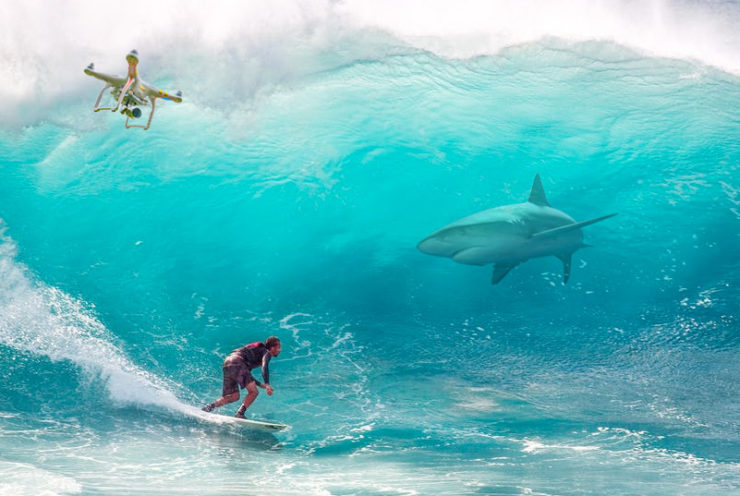 Australia is set to deploy a fleet of Artificial Intelligence drones to patrol some of the beaches in a bid to improve safety for those swimming in the ocean. The shark detecting drones can spot sharks from the skies at a higher accuracy rate. The AI-powered drones will use real-time aerial data to distinguish sharks from humans, boats or even other marine life.
Australia is set to deploy a fleet of Artificial Intelligence drones to patrol some of the beaches in a bid to improve safety for those swimming in the ocean. The shark detecting drones can spot sharks from the skies at a higher accuracy rate. The AI-powered drones will use real-time aerial data to distinguish sharks from humans, boats or even other marine life.
Humans are not good at detecting shark activity using aerial data, with studies showing a 30 percent maximum accuracy. These battery-powered Little-Ripper drones will provide a real-time video feed to a drone operator; who in turn uses a shark-spotting software system to identify sharks. According to Dr. Nabin Sharma, a technology researcher at the Sydney’s School of Software, deployment of drones will increase the shark detection accuracy by up to 90 percent. Sharma said that the application is not designed to replace humans altogether, but rather help them work effectively and at a higher accuracy.
A report published in the International Shark Attack File at the University of Florida ranked Australia second after the United States in the total number of unprovoked shark attacks in 2016. This year, an unexpected series of shark attacks hit Australia’s North East Coast, which was a major threat to the country’s reputation as a world-class tourist destination. This prompted the authorities to deploy protective nets in a bid to save lives; a decision that seemed controversial – environmentalists said the nets could harm wildlife while researchers questioned their effectiveness.
The University partnered with a commercial UAV company, Little-Ripper, to develop a more effective and reliable shark detection system. The Little Ripper drones which are set to begin working this month which will spot undersea predators in some of the most affected Australian beaches. The drones will pass live imagery showing signs of sharks to an AI system for verification. The Little Ripper drones are also equipped with a mechanism that uses a megaphone to notify swimmers and other people on the beach upon detecting a shark. According to one of the company’s co-founders, Paul Scully-Power, in such an emergency situation, the drones will also deploy a life raft to save lives. This highly automated system is quick and gives a new glimpse of light in curbing shark encounters to save lives.
The detection system relies heavily on machine learning, in that the researchers train the AI-powered system to pinpoint sharks bases on live aerial videos and distinguish them from humans, objects, and sea creatures. Apart from detecting sharks, this approach can also be used for whales, dolphins, and creatures of interest, which gives researchers better ways to track sea populations. The drones, which hold rescue beacons, will also save rescue helicopters valuable flight time. The UAV Company is also working to develop a shark repellent system, which will improve defense significantly.
Drones seem to be the most effective and eco-friendly protective methods of improving safety on our shores. Authorities have highly embraced the use of these robotic fliers to deal with sharks that pose a genuine threat, instead of using nets which are harmful to the local eco-system or fencing off some areas, which blocks access to other species.
|